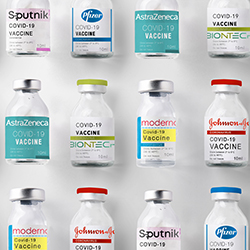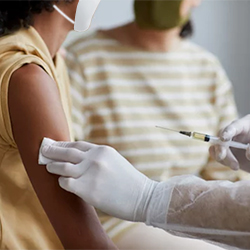By IDSE News Staff
The FDA amended its emergency use authorizations (EUAs) for both the Moderna and Pfizer-BioNTech COVID-19 vaccines to permit a single booster dose for everyone 18 years of age and older after completion of primary vaccination with any FDA-authorized or approved COVID-19 vaccine.

The FDA did not hold a meeting of the Vaccines and Related Biological Products Advisory Committee about these actions because the agency previously convened the committee for extensive discussions regarding the use of booster doses of COVID-19 vaccines and, after review of both Pfizer’s and Moderna’s EUA requests, the FDA concluded that the requests do not raise questions that would benefit from additional discussion by committee members.
In contrast, the CDC’s Advisory Committee on Immunization Practices (ACIP) did hold a meeting on Friday, Nov. 19, and expanded its COVID-19 recommendations to include a booster for all adults 18 and older, and shortly after, CDC Director Rochelle P. Walensky, MD, MPH, endorsed the ACIP’s expanded recommendations for booster shots.
“After critical scientific evaluation, today’s unanimous decision carefully considered the current state of the pandemic, the latest vaccine effectiveness data over time, and review of safety data from people who have already received a COVID-19 primary vaccine series and booster. Booster shots have demonstrated the ability to safely increase people’s protection against infection and severe outcomes, and are an important public health tool to strengthen our defenses against the virus as we enter the winter holidays. Based on the compelling evidence, all adults over 18 should now have equitable access to a COVID-19 booster dose.”
As of Nov. 22, 73.7% of the eligible population (age ≥5 years) have received at least one dose of COVID-19 vaccine; 62.9% are fully vaccinated; and 19.3% (age ≥18 years) have received boosters. In the United States, 47,587,441 people have tested positive and 770,461 people have died.
“Throughout the course of the COVID-19 pandemic, the FDA has worked to make timely public health decisions as the pandemic evolves. COVID-19 vaccines have proven to be the best and highly effective defense against COVID-19,” said Acting FDA Commissioner Janet Woodcock, MD. “Authorizing the use of a single booster dose of either the Moderna or Pfizer-BioNTech COVID-19 vaccine for individuals 18 years of age and older helps to provide continued protection against COVID-19, including the serious consequences that can occur, such as hospitalization and death.”
Daniel P. McQuillen, MD, FIDSA, the president of the Infectious Diseases Society of America, said the society supported the decision. “Data show that a booster shot provides highly effective continued protection against breakthrough COVID-19 infections, serious illness, hospitalization and death. Everyone 18 and older who received a two-dose mRNA vaccine should get their booster shots six months after they completed the series to maximize protection against COVID-19,” he said in a statement.
“As cases are rising in some parts of the United States, infectious diseases experts urge everyone who is eligible—including children 5 [years] and older—to get vaccinated before you travel or gather with loved ones this holiday season,” he added.
Before this broader authorization, a single booster dose of the Moderna and Pfizer-BioNTech COVID-19 vaccines was authorized for people 65 years of age and older, those 18 through 64 years of age at high risk for severe COVID-19, and individuals 18 through 64 years of age with frequent institutional or occupational exposure to SARS-CoV-2.
This EUA expands the use of booster doses of both vaccines to include all individuals 18 years of age and older at least six months after completion of the primary vaccination series of the Moderna COVID-19 vaccine or Pfizer-BioNTech COVID-19 vaccine, or at least two months after completion of primary vaccination with the single-dose Janssen COVID-19 vaccine.
“The FDA has determined that the currently available data support expanding the eligibility of a single booster dose of the Moderna and Pfizer-BioNTech COVID-19 vaccines to individuals 18 years of age and older,” said Peter Marks, MD, PhD, the director of the FDA’s Center for Biologics Evaluation and Research. “Streamlining the eligibility criteria and making booster doses available to all individuals 18 years of age and older will also help to eliminate confusion about who may receive a booster dose and ensure booster doses are available to all who may need one.”
Data Supporting Effectiveness
The EUA was granted based on the FDA’s analysis of immune response data that supported use in the previously authorized populations for boosters.
For the Moderna vaccine booster dose, the FDA analyzed the immune response data from 149 participants 18 years of age and older from the original clinical studies who received a booster dose at least six months after their second dose and compared it with the immune responses of 1,055 study participants after completing their two-dose series. The antibody response to the SARS-CoV-2 virus 29 days after a booster dose of the vaccine demonstrated a booster response.
For the Pfizer-BioNTech vaccine booster dose, the FDA analyzed the immune response data from approximately 200 participants 18 through 55 years of age who received a single booster dose about six months after their second dose. The antibody response to the SARS-CoV-2 virus one month after a booster dose, when compared with the response one month after the two-dose primary series, in the same individuals demonstrated a booster response.
Since Moderna and Pfizer-BioNTech initially submitted safety and effectiveness data on a single booster dose following primary vaccination to the FDA, additional real-world data have become available on the recently increasing number of U.S. cases of COVID-19 and on the risks for myocarditis and pericarditis following vaccination with these vaccines. These additional data enabled the FDA to reassess the benefits and risks of the use of these vaccines in the general adult population.
The FDA determined that the benefits of a single booster dose of either the Moderna or Pfizer-BioNTech COVID-19 vaccines outweigh the risks for myocarditis and pericarditis in individuals 18 years of age and older when used following the completion of the primary vaccination to provide continued protection against COVID-19 and the associated serious consequences that can occur, including hospitalization and death.
Both Pfizer and Moderna are conducting post-authorization/post-marketing studies to assess known serious risks for myocarditis and pericarditis, and the FDA and CDC are gathering active and passive surveillance for these adverse events.
The most commonly reported side effects by individuals who received a booster dose of the vaccines were pain, redness and swelling at the injection site, as well as fatigue, headache, muscle or joint pain, and chills. Of note, swollen lymph nodes in the underarm were observed more frequently following the booster dose than after the primary two-dose series.




